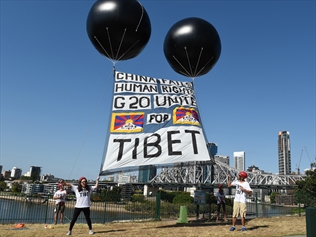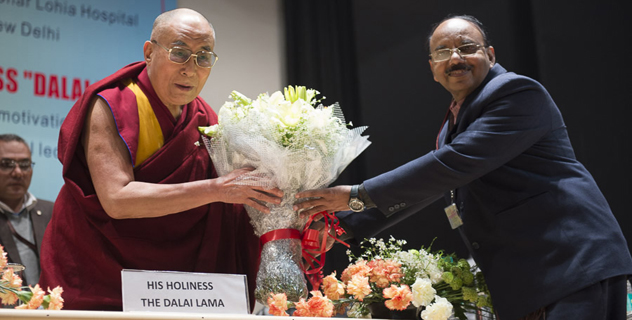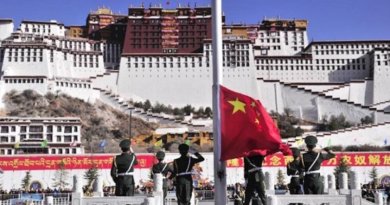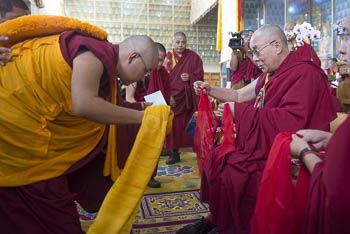‘We are not in favor of independence’: President Barack Obama reiterates U.S. position that Tibet is part of China
Francesca Chambers, MailOnline | November 12, 2014
President Barack Obama reaffirmed on Wednesday the United States’ position that Tibet is ‘part of the People’s Republic of China.’
‘We are not in favor of independence,’ Obama said during a joint press conference in Beijing with Chinese President Xi Jinping.
‘But we did encourage Chinese authorities to take steps to preserve the unique cultural, religious and linguistic identity of the Tibetan people,’ the U.S. leader said.
Obama has been unwavering in his stance that Tibet should remain under the control of China, sharing the same viewpoint with exiled Tibetan leader His Holiness the XIV Dalai Lama when he visited the White House earlier this year.
After the February meeting the White House said in a statement similar to the one offered by Obama today that the president expressed ‘strong support’ for traditions and ‘the protection of human rights for Tibetans.’
‘The President stressed that he encourages direct dialogue to resolve long-standing differences and that a dialogue that produces results would be positive for China and Tibetans,’ the White House said, and explained that the U.S. does not back independence for the region.
In response, the White House said the Dalai Lama ‘stated that he is not seeking independence for Tibet and hopes that dialogue between his representatives and the Chinese government will resume.’
Careful not to anger the Chinese, who said at the time that the meeting was ‘a gross interference in China’s internal affairs’ and ‘a serious violation of the norms of international relation,’ the White House kept the president’s hour-long one on one with spiritual leader of Tibet mostly quiet, keeping both his entrance and exit from the president’s home out of sight from photographers.
In today’s overseas press conference Obama advocated on behalf of Tibet without formally taking its side in its dispute with China, citing ‘America’s unwavering support for fundamental human rights of all people.’
Obama said he and President Xi ‘had a very healthy exchange around these issues,’ and he told the Chinese head that ‘it is so important for us to speak out for the freedoms that we believe are universal, rights that we believe are the birthright of all men and women, wherever they live, whether it is in New York or Paris or Hong Kong.’
Continuing, Obama said, ‘We think history shows that nations that uphold these rights – including for ethnic and religious minorities – are ultimately more prosperous, more successful, and more able to achieve the dreams of their people.’
In a statement following Obama’s remarks President Xi said he had a ‘candid discussion’ with his U.S. counterpart on the topic of human rights. He then pointed out that ‘over the last three decades and more of China’s reform and opening era, China has made enormous progress in its human rights.
That is a fact recognized by all the people in the world,’ he added, according to a White House transcript of the press conference.
That said, ‘we should never consider our work to be mission accomplished,’ Xi told reporters. ‘It’s always work in progress, and there is always room for further improvement.
‘China stands ready to have dialogue with the United States on human rights issues on the basis of equality and mutual respect so that we can constructively handle our differences, deepen our mutual understanding, and learn from each other.’
The U.S. has always walked a tightrope in regards to its relations with both China, a fellow world power that holds a significant amount of U.S. debt, and Tibet, whom it recognizes has been mistreated at the hands of the Chinese.
Since a 1959 uprising in Tibet, the country’s leader has lived in exile in India. China has subsequently painted him as a subversive whom the international community cannot trust.
The Dalai Lama professes non-violence in the battle for autonomy in his native region, but the Chinese say he is a ‘wolf in sheep’s clothing’ and privately supports a violent takeover.
‘The Dalai is definitely not a pure religious figure. He is using the cloak of religion to engage in long-term activities to separate China. He is a political exile,’ Chinese Foreign Ministry spokeswoman Hua Chunying said in a statement preceding the February 2014 meeting.
Meanwhile, human rights groups have accused China of using perverted methods themselves to keep Tibet’s residents in line.
The U.S. State Department even issued a report in 2012 acknowledging the abuses and noted that ‘the government’s respect for and protection of human rights…deteriorated markedly’ in the preceding year.
‘Under the banner of maintaining social stability, the government engaged in the severe repression of Tibet’s unique religious, cultural, and linguistic heritage by, among other means, strictly curtailing the civil rights of China’s ethnic Tibetan population, including the freedoms of speech, religion, association, and movement,’ reads the State Department’s report.
‘Other serious human rights abuses included extrajudicial killings, torture, arbitrary arrests, extrajudicial detentions, and house arrests,’ it said.
According to Reuters, more than 120 Tibetans – mostly monks and nuns – have protested China’s brutal rule of the territory by lighting themselves of fire.
During the Dalai Lama’s visit to Washington, D.C. nine months ago, then-White House Press Secretary Jay Carney told reporters the Obama administration was ‘concerned about continuing tensions and that the deteriorating human rights situation in Tibetan areas of China.’
As such, the Obama spokesman said, ‘We will continue to urge the Chinese government to resume dialogue with the Dalai Lama or his representatives without pre-conditions as a means to reduce tensions.’
The visit marked the third time the president had invited the ‘internationally respected religious and cultural leader’ to the White House since taking office. Previously the Dalai Lama and Obama met in February of 2010 and July of 2011.
After the 2010 meeting, the Dalai Lama was photographed leaving 1600 Pennsylvania Avenue unceremoniously through a side door, where piles of not yet disposed trash were heaped in the snow.
This year photographers never said the Nobel Peace Prize laureate coming or going. However, the White House said the meeting was held in the Map Room – not the prestigious Oval Office where the president usually holds important meetings and entertains world leaders.
No U.S. president has ever sat down with the Dalai Lama in the Oval Office, the White House has said.
The snubs are ostensibly meant to cool tensions with the Chinese over the assignations, though the White House refused in February to go on the record with an explanation.
‘We don’t have photographers in every meeting the president has,’ Carney told inquiring reporters.




